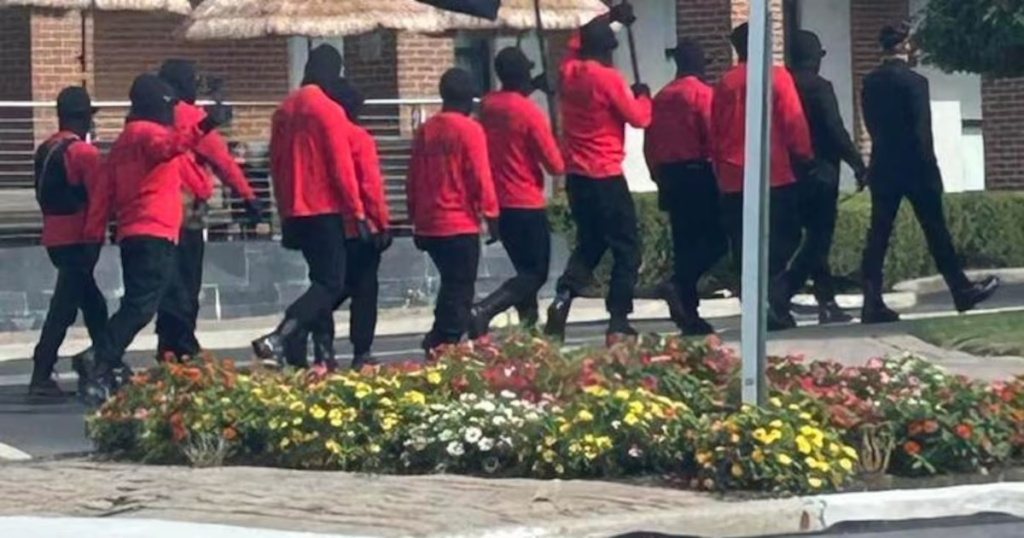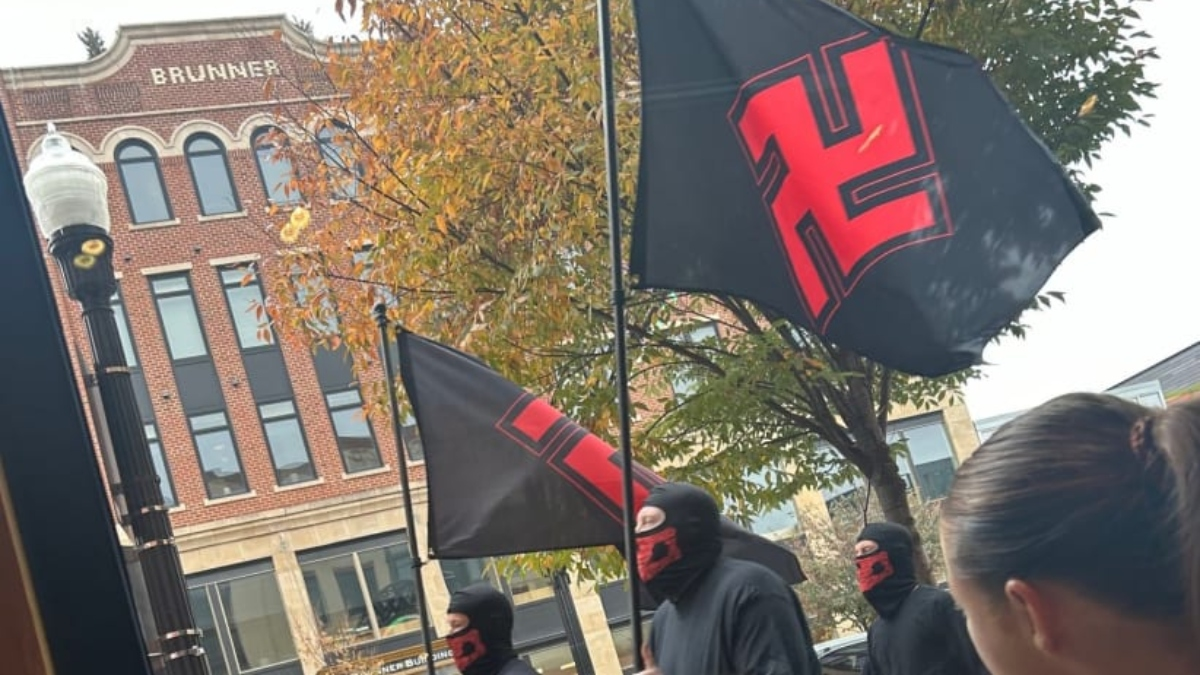Ohio was recently thrust into the spotlight as an unsettling march by neo-Nazis unfolded on the streets of its capital, Columbus. This alarming incident, characterized by masked individuals carrying swastika flags and promoting hateful ideologies, has drawn sharp condemnation from state leaders and the community at large.
The events raise critical concerns about the resurgence of extremism in public spaces and the pressing need for collective resistance against hate and intolerance.
Swastika Flag Raised in the Streets of Ohio: What Happened?
On a Saturday afternoon, a group of masked individuals, dressed in black uniforms and carrying swastika-adorned flags, marched through the streets of Columbus, Ohio. The disturbing imagery of Nazi symbols on public display shocked onlookers and quickly went viral through social media platforms.
The march reportedly began around 1 p.m., and local authorities started receiving multiple 911 calls shortly thereafter, prompting the Columbus Police to dispatch officers to the scene.
Despite concerns over potential violence, authorities concluded that no physical altercations occurred. Some participants in the march were briefly detained but later released as no charges were filed. Eyewitness accounts and video footage revealed that the participants also carried firearms, amplifying the sense of intimidation in the community.
Read : Bizarre No-Clothes Wedding Ceremony Took Place in Hedonism III Resort of Jamaica
The incident occurred shortly after a similar demonstration in Michigan, suggesting a disturbing trend of neo-Nazi activities in the region. Columbus itself has previously been a focal point for divisive and inflammatory narratives, making this recent event all the more disconcerting.
Community and Leadership’s Firm Response
The response from Ohio’s leaders was swift and unequivocal. Governor Mike DeWine took to social media to denounce the neo-Nazi march, stating, “There is no place in this State for hate, bigotry, antisemitism, or violence, and we must denounce it wherever we see it.” He condemned the marchers for hiding behind masks while promoting hateful and racist ideologies targeting people of color and Jewish communities.
Neo-Nazis marched through the streets of Columbus, Ohio today, clamoring for “white power.”
— Stephanie Kennedy (@WordswithSteph) November 17, 2024
Masked men dressed in black waved black flags with red swastikas, ranting at all people of color and shouting antisemitic slurs.
You can bet these were emboldened Trump voters. pic.twitter.com/oENUckX7zT
Columbus City Attorney Zach Klein also issued a strong statement, urging the neo-Nazis to leave the city. “Take your flags and the masks you hide behind and go home and never come back. Your hate isn’t welcome in our city,” Klein declared on social media.
A formal statement from the City of Columbus underscored the community’s commitment to fostering tolerance and diversity while rejecting acts of hatred and bigotry. The statement highlighted the city’s determination to protect residents from intimidation and harm, emphasizing that its strength lies in its diversity and collective unity.
Local leaders also pledged ongoing collaboration with the Columbus Division of Police to monitor the situation and ensure the safety and security of the city’s residents. The incident sparked a broader conversation about the importance of standing against hate and fostering an inclusive and equitable society.
The Resurgence of Hate Symbols: A Troubling Trend
The public display of Nazi symbols and the resurgence of neo-Nazi ideologies pose grave concerns for communities across the United States. Such incidents are not isolated; they reflect a troubling pattern of extremism seeking to intimidate and divide society. The presence of armed individuals carrying symbols of hatred further underscores the threat posed by these groups to public safety and democratic values.

Historically, Nazi symbols like the swastika have been synonymous with atrocities and genocides. Their reappearance in public spaces is a stark reminder of the enduring presence of hate-driven ideologies. Events like the Columbus march highlight the urgent need for vigilance, education, and community solidarity to combat the spread of extremism.
Experts emphasize the role of misinformation and divisive narratives in fueling such movements. Columbus has previously been a target of baseless rumors, including claims about Haitian immigrants during the presidential election. These narratives, amplified by political figures, can contribute to an environment where hate groups feel emboldened to act.
The incident in Columbus also raises questions about the responsibilities of social media platforms and law enforcement agencies in addressing extremism.
Videos and images of the march spread rapidly online, drawing widespread outrage but also potentially serving as a recruitment tool for hate groups. Balancing free speech with the need to prevent the dissemination of harmful ideologies remains a challenging but necessary endeavor.
Rejecting Hate and Building Resilience
The neo-Nazi march in Columbus serves as a wake-up call for communities and leaders to reaffirm their commitment to inclusivity, tolerance, and justice. Ohio’s leaders set an important example by unequivocally condemning the incident and standing in solidarity with affected communities. However, combating hate requires sustained efforts beyond immediate responses.
Community education plays a pivotal role in addressing the root causes of extremism. Schools, civic organizations, and religious institutions can work together to promote understanding, empathy, and critical thinking. Programs that teach the history and consequences of hate ideologies, including the Holocaust, are essential for fostering a society that rejects bigotry.

Law enforcement agencies must also be equipped to respond effectively to hate-driven incidents. While no physical violence occurred during the Columbus march, the presence of armed participants carrying hateful symbols created a climate of fear. Ensuring that police are trained to handle such situations sensitively and decisively is crucial for maintaining public trust and safety.
Finally, social media platforms must take greater responsibility for monitoring and addressing extremist content. While these platforms provide valuable tools for raising awareness and mobilizing against hate, they can also be exploited by hate groups to spread their ideologies and recruit followers. Strengthening content moderation policies and fostering partnerships with civil society organizations can help mitigate these risks.
The neo-Nazi march in Columbus underscores the persistent challenges posed by hate and extremism in modern society. While the incident is deeply troubling, the collective condemnation from Ohio’s leaders and community offers hope for a united response. By rejecting hate in all its forms and working together to promote inclusivity and understanding, communities can build a future where such incidents have no place.
Ohio’s leaders have made it clear: hate is not welcome. Now, the challenge lies in ensuring that this commitment translates into meaningful action, safeguarding the values of tolerance and diversity that define the state and the nation.

